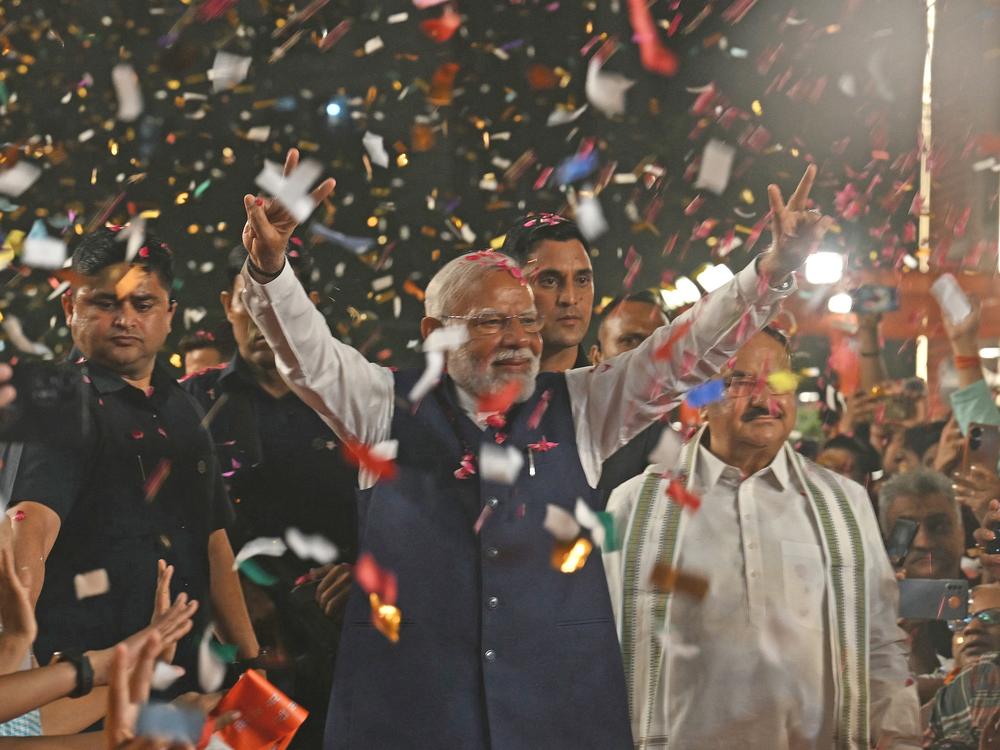Section Branding
Header Content
Modi has declared victory in India's election, but not the landslide he expected
Primary Content
NEW DELHI — Indian Prime Minister Narendra Modi has declared an election victory, as his coalition won more than half of parliamentary seats, with votes still being counted.
That sets Modi on course to win a third consecutive term — the country's first prime minister to do so in more than 60 years.
This comes after a six-week-long election, where nearly 1 billion people were eligible to vote.
The National Democratic Alliance "is going to form the government for the third time, we are grateful to the people," Modi said in a speech at the headquarters of his Bharatiya Janata Party (BJP) in New Delhi. "This is a victory for the world's largest democracy."
But the BJP's celebrations seem relatively muted.
Modi's alliance had set a bullish target to win 400 out of 543 parliamentary seats. As of 9 p.m. local time, it is leading with 288 seats, according to India’s election commission. The INDIA coalition of opposition parties picked up 233 seats, defying exit polls that predicted a much lower tally.
On Tuesday morning, only a small group of supporters had gathered at BJP headquarters in New Delhi as initial trends showed the alliance would not get a landslide victory. While one loudly sang hymns to a cut-out of Prime Minister Modi in front of TV cameras, the mood was relatively somber.
At the opposition Congress party office, supporters were cheering and dancing.
India’s stock market, meanwhile, plunged to a four-year low, Reuters reported, on news that the governing alliance was winning by a narrower margin than expected, which could make it harder to pass its legislation.
When the massive seven-phase election started in April, most analysts had predicted a landslide in favor of Modi and his allies.
At the time, Modi had inaugurated a Hindu temple built atop a mosque razed by Hindu nationalists in Ayodhya; the income tax department frozen Congress party’s bank accounts citing unpaid dues; and India’s top investigation agencies charged several opposition leaders for corruption or money-laundering charges.
While dismissing allegations of Modi’s authoritarianism, the BJP focused its campaign on economic growth, welfare programs and India’s rise on the world stage. The party has not tamed high inflation and unemployment in its decade in power, but several voters told NPR that Modi rose above his government’s failures.
After the first round of voting in April, however, the governing party's rhetoric became increasingly polarized on religious lines.
In his campaign speeches, Modi accused the Congress party of conspiring to steal wealth of the majority Hindus and distribute it among the minority Muslims, whom he called “intruders” and “those with more children.” After several complaints by the opposition parties, the election commission said it would hold party presidents responsible for transgressions of its star campaigners.
The opposition INDIA alliance — a coalition of two dozen parties led by the Congress — had pitched the election as a fight to save the country's constitution. Despite one key partner defecting before the polls, the Congress and strong regional parties helped the alliance pick up more seats than predicted. A key victory was in the bellwether state of Uttar Pradesh, where the opposition coalition was leading in nearly half the seats it had lost to the BJP in 2019. This included Faizabad, where the controversial Hindu temple is located.
In a victory speech on Tuesday evening, that started with salutation to a Hindu god, Modi reiterated his intent to make India a developed country over the next two decades. He added that he would work with all state governments, irrespective of the party.
Earlier in the evening, the opposition Congress party said the main opposition had won the seats despite BJP's “capture” of state institutions. Its leader Rahul Gandhi then pulled out a copy of the Indian Constitution and said the mandate was the "first step" in preventing Modi from attempting to change it.
“The main message of these elections is, the era of coalition politics is back, that the BJP's one-party domination model will not work anymore,” says professor Ashwini Kumar, a political analyst from Mumbai. “It also means that the BJP will have to put contentious ideological issues in cold storage, like the uniform civil code or simultaneous elections for state assembly and the Parliament.”
Kapil Komireddi, author of Malevolent Republic: A Short History of the New India, warns that the BJP could “poach” elected lawmakers from other parties — “an art they have perfected.”
“If this happens, the prime minister can be back to commanding a government with a majority in the Parliament,” he says. “The difference is, within his own party, everyone knows the magic has waned.”

